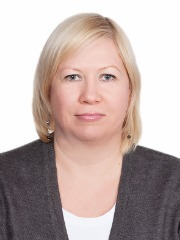Olga Vladimirovna Kataeva
+7(863) 250-75-40
Associate Professor
Institute of Philosophy and Social and Political Studies
Research interests:
Philosophy and history of science, ontology, theory of knowledge, epistemology, philosophical problems of computer and information technologies (e.g. virtual reality)
Teaching:
-
Philosophy
The course "Philosophy" represents introduction to a philosophical perspective. Its main purpose ; to create a complete system representation of the world and the place of a person in it, and also to form and develop the philosophical attitude and outlook, ability to analyze philosophical components of concrete sciences problems.
-
Ontology and theory of knowledge. Methodology
Purposes of the course "Ontology and theory of knowledge. Methodology" are development of knowledge of a subject and an object of methodology, about the main methods, methodological technics and approaches in philosophy and science, and also formation of ability to use the knowledge in philosophical and scientific research activity.
-
Synergetics and Virtualistics
The purpose of the course is acquaintance of students with urgent theoretical and methodological tools of a modern postnonclassical scientific paradigm.
-
Methodology of Social Studies and Humanities
The main objective of a course is studying of methodological problems of social and humanitarian knowledge and the ability to apply the methods of Social sciences and Humanities. Course Contents: 1. History of the development of methodology of social and humanitarian cognition. 2. Theory of methodology of social and humanitarian cognition. 3. Current methodological issues of cognitive activity practice in particular branches of social and humanitarian knowledge (philology, history, psychology, sociology, law, education studies and pedagogics).
-
Philosophical problems of technical knowledge and digital technologies
The purpose of the discipline ‘Philosophical problems of technical knowledge and digital technologies is to comprehend the philosophical problems associated with the rapid development of engineering and technology in modern civilisation. Objectives: 1) To analyse the state of development of modern technical knowledge, philosophy of technology; 2) To define the concepts of technology, technical knowledge, technical sciences, technology; 3) To consider the history of development of technology and technical sciences; 4) To study various approaches and philosophical concepts to understanding of technique and technology; 5) To identify different types of modern digital technologies; 5) To study philosophical problems of development of modern digital technologies (artificial intelligence, virtual and augmented reality, computer games); 6) To identify the prospects, consequences and dangers of the development of engineering and technology in modern civilisation.
-
Soviet Science and Science in Modern Russia
The academic discipline “Soviet Science and Science in Modern Russia" aims: to consider the development of science in Russia (the Soviet period and the modern period) as an integral cultural phenomenon. Objectives: 1) to consider the background and manifestations of science in various historical eras in Russia; 2) to analyze the influence of cosmism on the further development of science in the Soviet Union; 3) to study approaches to understanding science in the Soviet Union;
4) to consider the process and problems of the formation and development of science studies and scientometrics in Russia; 5) to identify the main approaches in the history of science, sociology of science, philosophy of science; 6) to identify the features of the modern stage of science development in Russia.
-
History and Philosophy of Science
The purpose of studying the discipline: gaining knowledge about the specifics of science and its historical formation; developing ideas about its basic functions, criteria of science and models of the growth of scientific knowledge. Tasks: 1) to form a holistic systemic scientific worldview; 2) to deepen the culture of scientific and rational thinking; 3) to demonstrate the inextricable relationship of philosophical and concrete scientific knowledge; 4) to comprehend critically the main worldview and methodological problems of the present in the field of philosophy of science; 5) to interpret critically the positive and negative consequences of the modern technological development of science, their worldview and methodological significance; 6) to apply existing principles and models of the development of scientific knowledge in the implementation of professional, teaching, research and management activities.
